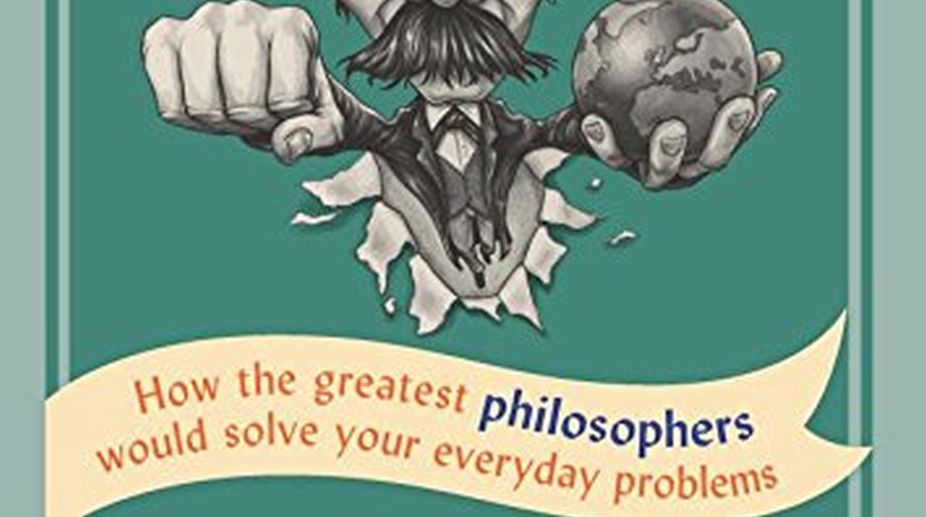‘The Simpsons’ Season Finale Takes Aim at Fox News, Facebook
He further revealed that the inspiration for the segment was a piece last year in the Atlantic titled 'The Life in 'The Simpsons' Is No Longer Obtainable'.

Nietz (Photo: IANS)
Title: What Would Nietzsche Do?
Author: Marcus Weeks
Publisher: Cassell Illustrated/Hachette UK
Advertisement
Pages: 193
Price: Rs 499
Your smartphone gets lost and you are worried about identity theft. Did you know that the basic issue underlying this predicament has already been dealt with by great thinkers centuries ago? That problems or issues of your love life have a philosophical basis? Or that someone most likely to sympathise with your wish to chuck up your conventional but boring job to follow what your heart desires is none other than Karl Marx?
The issue of the lost phone with all your vital details and facets of your life stems from the basic philosophical question: “What makes me who I am?”, and whether our changing body, thoughts and ideas, personality — and now possessions — affect this. And pre-Socratic philosopher Heraclitus of the “Ship of Theseus” conundrum, to Rene “I think, therefore I am” Descartes, have weighed in on this long before smartphones came into existence.
Then take the mysterious and maddening sphere of love.
In cases of broken hearts and what to do about them, we must know if there is a point to or benefit of suffering; the dilemma of whether you should tell a friend that he/she is being cheated by their partner rests on whether we have a moral duty to always tell the truth; and differing objectives from a relationship rise from views on sensual pleasures, subjectivity of experience and letting social conventions dictate our moral choices.
“Life has a habit of presenting us with dilemmas, some serious and some trivial, that require a bit of thought, and perhaps some guidance. And when it comes to thinking about problems, there’s nobody more skilled than the great philosophers,” says Marcus Weeks, who has been music teacher, taught English as a foreign language, an art gallery manager besides authoring a range of books.
But as most philosophers were “so preoccupied with thinking about the big stuff — life, the universe and everything — that they seldom gave us the benefit of their wisdom on the little things, the problems of everyday life”, he seeks to remedy this deficiency here in this book.
“So, we can’t be sure exactly of what any philosopher’s answer would be, but we can get a pretty fair idea of the way each thinker would look at the problem,” he says, going on to use ideas of an eclectic group of over 80 philosophers and thinkers from all over history and the world, not only the Western intellectual tradition, for this purpose.
And thus those on call range from Aristotle to Alan Turing, the Buddha to (Simone) de Beauvoir, Confucius to Camus, Machiavelli to Marx, and many more.
Divided into five broad sections — relationships, work, lifestyle, leisure and politics, the questions range from the (relatively) small matters of modern life (what causes addiction to technological devices or the relative merits of Shakespeare and “The Simpsons”) to more vital issues (is it justified to somehow sideline colleagues to a promotion, how can we convey to the government our resentment at its functioning or is it ethical to eat meat) and then the great questions of existence (why are we scared of dying or how can we believe in existence of a benign deity in a world full of evil).
Weeks here does stress that many of these problems are not “specifically ‘philosophical’, but, like almost everything, they can be approached philosophically”.
Some practitioners would use the chance to delve deeper into “hidden implications”, many would “make a connection between the question and their own ideas and theories” and, more often, they will express different solutions and conflicting advice, based on their own outlook and approach.
Given the different avenues that are indicated, the book may be seen as a cross between a freewheeling account of intellectual debates and a sort of “self-help guide” to some of our problems. But as it uses philosophers’ view of the underlying inherent moral problems, causes and likely solutions, it never presumes to offer any direct guidance or indicate which course is best to follow.
For that’s the basis of any good philosophy — indicating the ways but leaving it to us to choose which one is suitable.
Advertisement